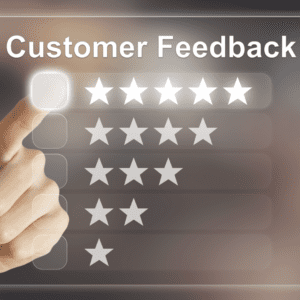Social media marketing is a powerful tool for businesses. By monitoring specific social media metrics, you can gain valuable insights into your social media performance and make data-driven decisions to optimize your strategy. In this blog post, we’ll explore five must-track KPIs to measure your social media marketing success. From engagement rates to conversion rates, we’ll cover the social media metrics that matter most and provide tips for improving your social media performance. So, grab a cup of coffee and let’s dive in!
"Over 4.74 billion people across the world use social media"
Hootsuite
Understanding the Basics of KPI Metrics
Key Performance Metrics, or KPIs, are essential for businesses to monitor their progress and success. Understanding what KPIs are and why they are important can help businesses set realistic goals, track their performance, and make informed decisions. KPI metrics are specific, measurable indicators that can be used to monitor progress towards achieving goals.
Examples of KPIs include revenue growth, customer satisfaction, website traffic, social media reach, and employee productivity. Tracking these metrics can provide valuable insights into the success of a business and identify areas for improvement. It is crucial for businesses to select the right KPIs to track in order to effectively evaluate their performance. By understanding the basics of social media metrics, businesses can make informed decisions and take action to reach their goals.

When it comes to social media marketing, KPI metrics play an important role in measuring the success of campaigns. Social media metrics such as engagement rates, click-through rates, and conversion rates are essential in understanding how well a brand is resonating with its target audience on social media. By setting up appropriate KPIs for social media marketing campaigns, businesses can identify areas for improvement and make data-driven decisions that lead to greater success.
For instance, if a brand aims to increase its social media following, tracking social media metrics such as new followers acquired per week or per month can help guide its social media strategies towards this goal. Incorporating KPI metrics into social media marketing strategies helps businesses optimize their efforts for maximum impact and reach.
Five Must-Track KPIs for Social Media Marketing Success
When it comes to social media marketing, tracking the right Key Performance Indicators (or KPIs) is crucial to achieving success. The five must-track KPIs for social media marketing are reach, engagement, sentiment, website traffic, and conversions.
- Reach is a basic metric that helps measure how many people are exposed to your message.
- Engagement refers to the level of interaction your audience has with your content, such as likes, shares, and comments.
- Sentiment measures how your audience feels about your brand or product.
- Website traffic tracks the number of visitors to your website from social media platforms.
- Conversions are the ultimate goal of any marketing campaign, measuring the number of people who take a desired action, such as making a purchase or filling out a contact form.
By tracking these five KPIs, brands can measure and improve their social media marketing efforts, ultimately leading to greater success and higher ROI.
"Worldwide, people spend an average of 2 hours and 28 minutes per day on social media"
Hootsuite
Reach

Reach is an important social media KPI that measures how many people are seeing your brand’s content. This metric helps businesses evaluate the overall effectiveness of their social media marketing campaigns.
When tracking reach, it’s important to look at the number of followers, likes, and shares your posts are receiving on various platforms. Knowing which posts are reaching more people than others can help brands adjust their social media strategy accordingly. By improving reach, businesses can expand their audience and increase brand awareness.
Engagement
One of the most important key performance metrics for social media is engagement. Engagement refers to the level of interaction that a given post or piece of content is receiving, which can be measured through likes and comments. Understanding which posts are garnering the most engagement is crucial for brands and businesses, as it provides insight into what type of content is resonating with their audience.
By analyzing engagement, brands can determine which posts are driving conversions and guiding future posts that will continue to drive conversions. Therefore, paying attention to engagement rates is vital for businesses that want to improve their social media strategies and increase their overall success on social media.
Sentiment
Sentiment analysis is a useful social media metric that helps to measure how your brand or product is perceived by your target audience. By categorizing reactions as positive, negative or neutral, you can gain valuable insights into the overall sentiment towards your brand.
This knowledge is essential to help you adjust your content and messaging to better engage with your key stakeholders. Understanding how users feel about your brand is key to building long-term relationships with them.
In today’s digital age, social media has made it easier for brands to carry out sentiment analysis as it allows for real-time monitoring of customer feedback. Incorporating sentiment analysis as a key performance metric can give you valuable insights that will help you build a strong brand reputation and connect with your audience on a more personal level.

Website Traffic
When it comes to measuring the success of your website, tracking website traffic is crucial. UTM parameters, short pieces of code added to URLs that tracks the source of website traffic, can help you measure the number of people who visit your website from a given social media platform or post. By analyzing this data, you can gain valuable insights into what kind of content resonates with your target audience and what works best for driving organic traffic.
However, it’s not just enough to measure the number of visitors to your site. To truly understand the effectiveness of your content, audience retention is also a key performance metric to consider. This measures how long visitors stay on your site and engage with your content, providing valuable insights into whether your content is engaging enough to keep your audience interested. By tracking both website traffic and audience retention, you can gain a comprehensive understanding of the effectiveness of your content and make data-driven decisions to improve your website’s performance over time
Conversions
Ultimately, the end goal of any social media marketing campaign is to drive conversions. Whether it’s making a purchase, filling out a contact form, or signing up for a newsletter, conversions are the ultimate measure of success. By tracking conversion metrics, such as click-through rates and the number of sales generated from social media traffic, businesses can identify which campaigns are driving the most conversions and adjust their strategies accordingly.
77% of social media marketers say social media marketing has been somewhat to very effective for their company this year.
Hubspot
When it comes to measuring the success of your business, social media metrics are essential. Tracking metrics such as follower ship can help you understand how your business is performing across various channels. Utilizing automated dashboards or analytics platforms can help you make sense of this data and identify areas where further action is needed. These tools can quickly analyze data and provide insights, allowing you to make informed decisions about your business strategy.
Additionally, these tools allow for the tracking of results against set goals over time, which can help you understand how your business is progressing towards its objectives. By focusing on key performance metrics such as follower ship and utilizing these tools, you can gain valuable insights into the performance of your business and make informed decisions to drive growth and success.
Finally, in order to truly maximize the effectiveness of your social media metrics, it is essential to continuously evaluate the impact of your chosen strategies. This ongoing analysis provides valuable insights into whether or not you are successfully achieving your desired goals, and helps you to quickly identify any areas for improvement or adjustment.
Without consistent evaluation, your KPIs are essentially useless, as you will have no way of knowing whether or not you are making progress towards your objectives. By regularly monitoring your social media metrics and analyzing their impact, you can take the necessary steps to ensure that your strategy is as effective as possible, and make any necessary changes to stay on track towards achieving your goals.
Final Say
In conclusion, tracking KPIs is essential if you want to measure the success of your social media marketing efforts. By doing so, you can gain valuable insights into your audience’s behavior and interests, as well as identify areas for improvement. Remember, the most important KPIs to track are engagement rates, reach, sentiment, website traffic and conversion rates. With a clear understanding of these metrics, you can optimize your social media strategy to drive better results and ROI. So, start tracking your KPIs today and take your social media marketing to the next level!




